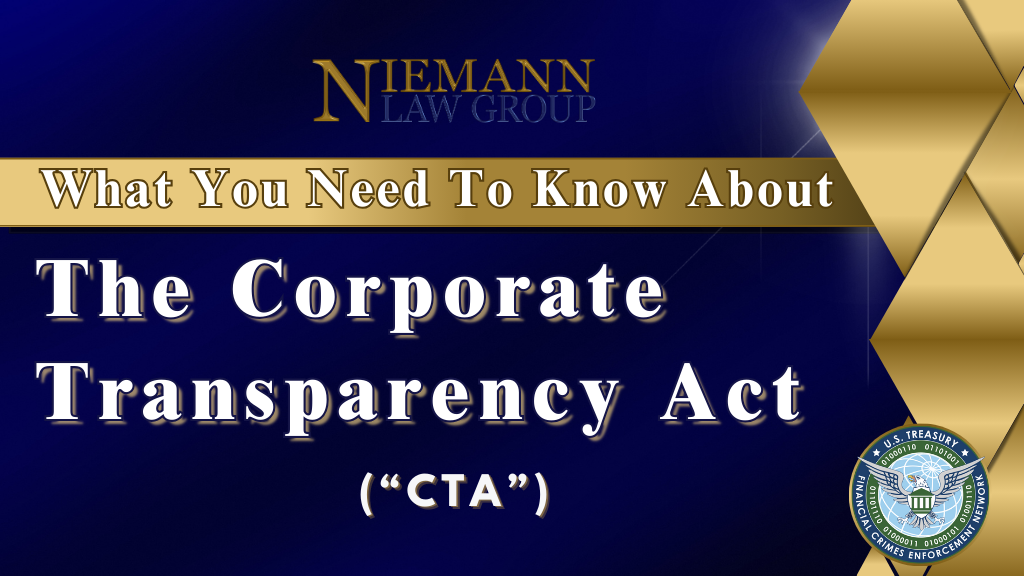Introduction
The Corporate Transparency Act (CTA), effective from January 1, 2024, introduces a transformative shift in the regulatory framework for business entities in the United States. This new legislation requires a range of business entities, including limited liability companies, corporations, limited partnerships, and their beneficial owners, to file specific information with the Financial Crimes Enforcement Network (FinCEN). The primary aim of the CTA is to combat financial crimes such as money laundering and terrorism financing by enhancing transparency in business ownership. Its extensive scope includes large corporations, small businesses, and even entities established for estate planning purposes.

The beneficial ownership information is reported into the online Beneficial Ownership Secure System (“BOSS”), which is administered by FinCen. This information is not available to the public, including via any Freedom of Information Act requests, but is available to FinCen, federal, state, and local law enforcement, certain financial institutions (with client consent), and other permitted parties.
While the Corporate Transparency Act primarily targets illicit financial activities, its impact on small businesses cannot be overlooked. Small business owners, often with limited resources, must navigate these new regulations, which could pose administrative challenges. Understanding the exemptions and seeking guidance when necessary can help mitigate these challenges.
Key Parties For the Corporate Transparency Act
“Reporting Company” means any corporation, limited liability company, or other similar entity that is “created by the filing of a document” or “registered to do business by the filing of a document.”
- Note, the CTA currently exempts twenty-three (23) types of entities from the reporting requirements. While each exemption should be reviewed carefully, the most common exemptions include qualified charities, and business entities satisfying all three of the following criteria:
- Has an operating presence at a physical office within the United StatesHas at least twenty (20) full-time employees
- Has more than $5 million in gross receipts or sales in the previous year, publicly traded entities or those otherwise regulated by the federal government
Of note, many real estate investors purchase property via a special purpose entity, such as an LLC – many LLCs will not satisfy the above exemption requirements.
“Beneficial Owner(s)” means any individual who, directly or indirectly, either i) exercises substantial control over such Reporting Company or owns or ii) controls at least 25% of the ownership interests of such Reporting Company.
- Further, if a trust satisfies either of the above two requirements, the trustee or beneficiaries may be considered Beneficial Owner(s) under the CTA. Whether an individual has “substantial control” over a Reporting Company requires an analysis of the provisions of the CTA.
“Company Applicant(s)” means both, (1) the individual who directly and physically files the document that creates a domestic entity or registers a foreign entity, and (2) the individual who is primarily responsible for directing or controlling such filings.
Reporting Timeline
The CTA sets specific deadlines for reporting:
- Existing Entities: Those in existence as of January 1, 2024, must submit Beneficial Ownership Information (BOI) Reports by January 1, 2025.
- New Entities: Entities established between January 1, 2024, and January 1, 2025, are required to file BOI Reports within 90 days of their formation or public announcement. For entities formed on or after January 1, 2025, the reporting window is 30 days from the date of formation or public announcement.
In addition to these initial reporting requirements, entities are obligated to report any significant changes. This includes updates to beneficial owners’ addresses or changes in the business address of the Reporting Company. The 30-day window for reporting these changes underscores the need for ongoing vigilance and record-keeping.
Disclosed Beneficial Ownership Information
Company information refers to a Reporting Company’s basic organizational information. This consists of:
- The full legal name and any trade or d/b/a names of the company
- The street address for its principal place of business
- State, tribal, or foreign jurisdiction of formation
- Employer Identification Number or foreign tax identification number
Beneficial Owner and Company Applicant Information is the main purpose of the reporting requirements under CTA and must be reported for each Beneficial Owner and Company Applicant. For each individual, this information should consist of:
- Their full legal name
- Their date of birth
- Their residential address (with limited exceptions)
- An image of and the unique identifying number shown on, any one of the following:
- A current US passport
- A current state-issued driver’s license
- A current state, local, or tribal identification document; or if none of the foregoing are applicable to such individual, the individual’s current foreign passport.
FinCEN Identifier
Alternatively, Reporting Companies and individuals have the option to apply for a unique ‘FinCEN identifier‘ number from the Financial Crimes Enforcement Network (FinCEN). Once obtained, this identifier can be used in place of providing detailed personal information directly to FinCEN. It is crucial for entities and individuals to keep this information current. Therefore, similar to the necessity of updating and correcting BOI reports, any changes in the details provided in the FinCEN identifier application must be promptly reported through a revised application. This process ensures that the FinCEN database remains accurate and up to date, facilitating more efficient and effective oversight.
- Note, each individual is only permitted to hold one FinCEN ID. Thus, if for any reason an individual needs a FinCEN ID for nonbusiness purposes (i.e., they are a Beneficial Owner of an entity in their personal capacity), then their residential address will be required to be reported.
As for Reporting Companies, they may only report another entity’s FinCEN Identifier and full legal name concerning its Beneficial Owners only if:
- The other entity has obtained a FinCEN identifier and provided that FinCEN identifier to the Reporting Company;
- An individual is or may be a Beneficial Owner of the Reporting Company by virtue of an interest in the Reporting Company that the individual holds through an ownership interest in the other entity; and
- The Beneficial Owner(s) of the other entity and of the Reporting Company are the same individuals.
Compliance and Penalties
Adhering to the CTA is mandatory, and non-compliance carries severe consequences. Non-compliance, defined by either failing to report or providing fraudulent information, can lead to civil penalties of up to $500 per day until the violation is rectified – note that this is per company/LLC! In more severe instances, such as willful provision of false information, the penalties increase significantly, including fines up to $10,000 and imprisonment for up to two years. The severity of these penalties highlights the critical importance of understanding and complying with the CTA’s requirements.
Practical Steps for Compliance
Business owners must take practical steps to ensure compliance with the CTA. This includes conducting a thorough review of their business structures to determine if they fall under the CTA’s purview and identifying the Beneficial Owner(s) who must be reported. It also involves setting up processes to collect, verify, and update the required information. Businesses may need to invest in new systems or seek external assistance to manage these requirements effectively.
RESOURCES
The Authors
Ferd Niemann
Ferd Niemann is a real estate investor and business-minded lawyer, as well as a trained financial analyst and an experienced entrepreneur. His experience includes mobile home park investments and turnarounds, retail development and redevelopment, residential investments, and real estate law. In addition to his investments as an operator, Ferd has invested in storage, apartments, restaurants, medical startups, and a handful of other ventures.
Read More About Ferd >>>



